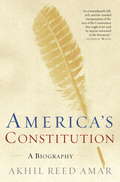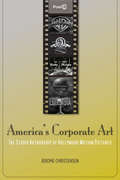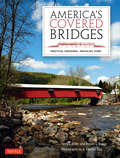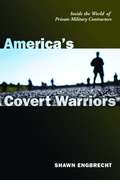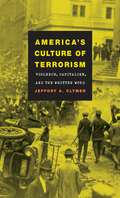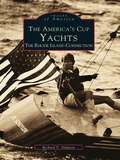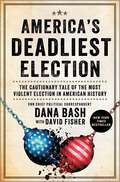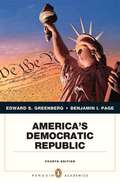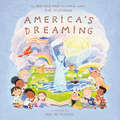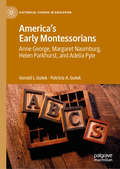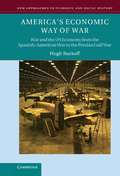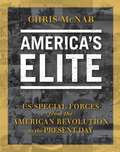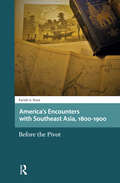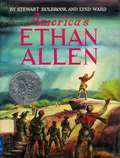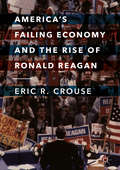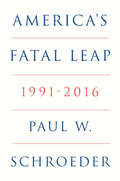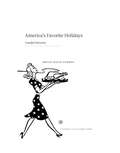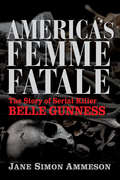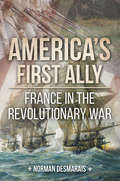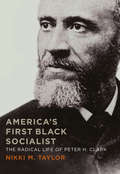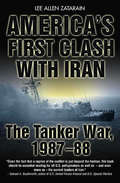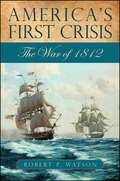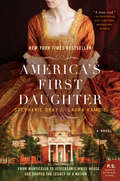- Table View
- List View
America's Constitution: A Biography
by Akhil Reed AmarIn America's Constitution, one of this era's most accomplished constitutional law scholars, Akhil Reed Amar, gives the first comprehensive account of one of the world's great political texts. Incisive, entertaining, and occasionally controversial, this "biography" of America's framing document explains not only what the Constitution says but also why the Constitution says it. <p><p>We all know this much: the Constitution is neither immutable nor perfect. Amar shows us how the story of this one relatively compact document reflects the story of America more generally. (For example, much of the Constitution, including the glorious-sounding "We the People," was lifted from existing American legal texts, including early state constitutions.) In short, the Constitution was as much a product of its environment as it was a product of its individual creators' inspired genius. <p>Despite the Constitution's flaws, its role in guiding our republic has been nothing short of amazing. Skillfully placing the document in the context of late-eighteenth-century American politics, America's Constitution explains, for instance, whether there is anything in the Constitution that is unamendable; the reason America adopted an electoral college; why a president must be at least thirty-five years old; and why-for now, at least-only those citizens who were born under the American flag can become president. <p>From his unique perspective, Amar also gives us unconventional wisdom about the Constitution and its significance throughout the nation's history. For one thing, we see that the Constitution has been far more democratic than is conventionally understood. Even though the document was drafted by white landholders, a remarkably large number of citizens (by the standards of 1787) were allowed to vote up or down on it, and the document's later amendments eventually extended the vote to virtually all Americans. We also learn that the Founders' Constitution was far more slavocratic than many would acknowledge: the "three fifths" clause gave the South extra political clout for every slave it owned or acquired. <p>As a result, slaveholding Virginians held the presidency all but four of the Republic's first thirty-six years, and proslavery forces eventually came to dominate much of the federal government prior to Lincoln's election. <p>Ambitious, even-handed, eminently accessible, and often surprising, America's Constitution is an indispensable work, bound to become a standard reference for any student of history and all citizens of the United States. <p>[This text is listed as an example that meets Common Core Standards in English language arts in grades 11-12 at http://www.corestandards.org.]
America's Corporate Art: The Studio Authorship of Hollywood Motion Pictures (1929-2001)
by Jerome ChristensenContrary to theories of single person authorship, America's Corporate Art argues that the corporate studio is the author of Hollywood motion pictures, both during the classical era of the studio system and beyond, when studios became players in global dramas staged by massive entertainment conglomerates. Hollywood movies are examples of a commodity that, until the digital age, was rare: a self-advertising artifact that markets the studio's brand in the very act of consumption. The book covers the history of corporate authorship through the antithetical visions of two of the most dominant Hollywood studios, Warner Bros. and MGM. During the classical era, these studios promoted their brands as competing social visions in strategically significant pictures such as MGM's Singin' in the Rain and Warner's The Fountainhead. Christensen follows the studios' divergent fates as MGM declined into a valuable and portable logo, while Warner Bros. employed Batman, JFK, and You've Got Mail to seal deals that made it the biggest entertainment corporation in the world. The book concludes with an analysis of the Disney-Pixar merger and the first two Toy Story movies in light of the recent judicial extension of constitutional rights of the corporate person.
America's Covered Bridges
by Terry E. Miller A. Chester Ong Ronald G. KnappThe history of North America is in many ways encapsulated in the history of her covered bridges. The early 1800s saw a tremendous boom in the construction of these bridges, and in the years that followed as many as 15,000 covered bridges were built. Today, fewer than a thousand remain.Without covered bridges to span the rivers and provide access to vast swaths of the interior that had previously been difficult to access-America never would have developed the way she did. In America's Covered Bridges, authors Terry E. Miller and Ronald G. Knapp tell the fascinating story of these bridges, how they were built, the technological breakthroughs required to construct them, and above all the dedication and skill of their builders. Each of the bridges, whether still standing or long gone, has a story to tell about the nature of America at the time-not only about its transportational needs, but the availability of materials and the technological prowess of the people who built it.This book is absolutely packed with fascinating stories and information-passionately told by two leading experts on this subject. The book will be of tremendous interest to anyone interested in American history, carpentry and early technology.
America's Covert Warriors: Inside the World of Private Military Contractors
by Shawn Engbrecht<p>Private military contractors, especially those in Iraq, have taken on far more than their original mandates required. Initially intended for combat support, they have become full-fledged warriors, many with little experience, scant oversight, and no accountability to the rules of engagement that constrain the U.S. military and coalition forces. When the occupation of Iraq turned into a fight against an insurgency, overwhelming U.S. and coalition military forces, the demand for private military contractors skyrocketed in 2003 and 2004. The explosive growth of such firms as Blackwater, Crescent, and others resulted in a relaxation of recruitment standards at precisely the same time that the U.S. military’s own standards of recruitment began to falter, but the standards for private military contractors fell much further and faster. The predictable result included excessive civilian casualties, a human tragedy whose full dimensions have yet to be seen by the American public. <p>Shawn Engbrecht has been training and recruiting private military contractors for more than a decade. Acknowledging that some private military contractors are out of control, he argues that the oft-made suggestion to fire them all is not the solution. Instead, Engbrecht contends that with proper training and development of recruits, along with enforceable regulation and oversight, private security companies can be successfully integrated into a total force package with a professional operational staff.</p>
America's Culture of Terrorism
by Jeffory A. ClymerAlthough the terrorist attacks of 11 September 2001 shocked the world, America has confronted terrorism at home for well over a century. With the invention of dynamite in 1866, Americans began to worry about anonymous acts of mass violence in a way that differed from previous generations' fears of urban riots, slave uprisings, and mob violence. Focusing on the volatile period between the 1886 Haymarket bombing and the 1920 bombing outside J. P. Morgan's Wall Street office, Jeffory Clymer argues that economic and cultural displacements caused by the expansion of industrial capitalism directly influenced evolving ideas about terrorism.In America's Culture of Terrorism, Clymer uncovers the roots of American terrorism and its impact on American identity by exploring the literary works of Henry James, Ida B. Wells, Jack London, Thomas Dixon, and Covington Hall, as well as trial transcripts, media reports, and the cultural rhetoric surrounding terrorist acts of the day. He demonstrates that the rise of mass media and the pressures of the industrial wage-labor economy both fueled the development of terrorism and shaped society's response to it. His analysis not only sheds new light on American literature and culture a century ago but also offers insights into the contemporary understanding of terrorism.
America's Cup Yachts, The: The Rhode Island Connection
by Richard V. SimpsonThe dominance of the New York Yacht Club, in possession of the America's Cup between 1851 and 1983, has given Newport, Rhode Island, the status of yachting capital of the world. Seven of the most respected America's Cup defenders were built in Bristol, Rhode Island. The state's contribution to racing yacht technology began in Bristol, when N.G. Herreshoff designed and built the Vigilant in 1893. The Goetz Custom Sailboat Company continues the Bristol tradition of building superior sailing vessels, many of which have been challengers for the coveted America's Cup, beginning with the America 3 in 1992. In his sixth volume for the Images of America series, author Richard V. Simpson explores the allure of the America's Cup yachts and racing through more than 200 images from his own diverse collection. The photographs focus on the beauty and dignity of the yachts, the genius of engineering minds, and the handiwork of skilled crafters. Within these pages, view a variety of rare images captured by turn-of-the-century biograph and stereoscopic cameras, and experience the majestic dance of the yachts as they jockey for position, from the starting gun to the crossing of the finish line.
America's Deadliest Election: The Cautionary Tale of the Most Violent Election in American History
by Dana BashThe violent election of 1872 that serves as a warning for today's divided politics. <P><P> From CNN’s Chief Political Correspondent Dana Bash, the fast-paced story of the extraordinary election that led to hundreds of murders, warfare in the streets of New Orleans, two governors of Louisiana—and changed the course of politics in our country. <P><P> The Election of 1872 was the most contentious in American history. After both parties complained of corruption, neither candidate would concede, two governors claimed office and chaos erupted. Rival newspapers engaged in a bitter war of words, politicians plotted to overthrow the government, and their supporters fought in the streets and attempted assassinations. The entire country watched in grim fascination as the wounds of the Civil War were ripped open and the promise of President Grant’s Reconstruction faltered in the face of violent resistance and the birth of the Ku Klux Klan. <P><P> In this riveting book, Dana Bash and David Fisher tell the incredible, little-known story of the election that pushed democracy to the breaking point, and sparked historic events including: <P><P> The Colfax Massacre, in which at least 150 Black men were killed by white supremacists The extraordinary train race from New York to New Orleans for control of the state government The election of the first black Congressman from Louisiana in the face of violent resistance The Supreme Court ruling that ended Reconstruction and became the foundation of Southern segregation, changing the American legal system for the next century Readers will find eerie parallels to today's divided political landscape and leaders willing to seize power no matter the cost. An eye-opening warning of what's at stake and what it takes to protect our democracy, this is a must-read tale of America's deadliest election. <p> <b>New York Times Bestseller</b>
America's Democratic Republic (Fourth Edition)
by Edward S. Greenberg Benjamin I. PageUpdated in a new 4th edition, America's Democratic Republic is a brief, affordable book in an accessible trade-like format that explores the clash between the democratic aspirations of the American people and the republican foundations of our Constitution. Written with a lively, narrative style, this text traces the storyline of American government and focuses on the long standing and inescapable tension between the country's 18th century republican Constitutional foundations and the democratic aspirations of the American people.
America's Dirty Wars
by Russell CrandallThis book examines the long, complex experience of American involvement in irregular warfare. It begins with the American Revolution in 1776 and chronicles big and small irregular wars for the next two and a half centuries. Examples taken from the American experience reveal that fighting - and, more so, winning - all types of wars is extraordinarily complex, frustrating, controversial and bloody. What is readily apparent in dirty wars is that failure is painfully tangible while success is often amorphous. Successfully fighting these wars often entails striking a critical balance between military victory and politics. America's status as a democracy only serves to make fighting - and, to a greater degree, winning - these irregular wars even harder. Rather than futilely insisting that Americans should not or cannot fight this kind of irregular war, Russell Crandall argues that we would be better served by considering how we can do so as cleanly and successfully as possible.
America's Dreaming
by Bob McKinnonFrom New York Times bestselling author Bob McKinnon comes a story about seeking inspiration from our past to become our best selves in the future.Have you ever felt alone? Have you ever desperately wanted to fit in? America understands how you feel.America dreams of adventures, making new friends, and being strong. But America&’s first day at a new school turns out to be a nightmare.Fortunately, America&’s new teacher introduces the Welcome Wagon—a cart filled with books about real-life historical figures who also had trouble feeling accepted. When America falls asleep that night, Amelia Earhart, Sojourner Truth, Martin Luther King Jr., and Emma Lazarus jump off the pages to share their stories—inspiring America to return to school the next day and make their dreams come true.While we never see America, Bob McKinnon&’s lyrical writing and Thai My Phuong&’s unique, sweeping art helps readers see the world through America&’s eyes and encourages us all to be as kind as we are brave, because everyone always deserves to feel welcome.
America's Early Montessorians: Anne George, Margaret Naumburg, Helen Parkhurst and Adelia Pyle (Historical Studies in Education)
by Gerald L. Gutek Patricia A. GutekThis book traces the early history of the Montessori movement in the United States through the lives and careers of four key American women: Anne George, Margaret Naumburg, Helen Parkhurst, and Adelia Pyle. Caught up in the Montessori craze sweeping the United States in the Progressive era, each played a significant role in the initial transference of Montessori education to America and its implementation from 1910 to 1920. Despite the continuing international recognition of Maria Montessori and the presence of Montessori schools world-wide, Montessori receives only cursory mention in the history of education, especially by recognized historians in the field and in courses in professional education and teacher preparation. The authors, in seeking to fill this historical void, integrate institutional history with analysis of the interplay and tensions between these four women to tell this educational story in an interesting—and often dramatic—way.
America's Economic Way of War: War and the US Economy from the Spanish-American War to the First Gulf War
by Hugh RockoffHow did economic and financial factors determine how America waged war in the twentieth century? This important new book exposes the influence of economics and finance on the questions of whether the nation should go to war, how wars would be fought, how resources would be mobilized, and the long-term consequences for the American economy. Ranging from the Spanish-American War to the Gulf War, Hugh Rockoff explores the ways in which war can provide unique opportunities for understanding the basic principles of economics as wars produce immense changes in monetary and fiscal policy and so provide a wealth of information about how these policies actually work. He shows that wars have been more costly to the United States than most Americans realize as a substantial reliance on borrowing from the public, money creation and other strategies to finance America's war efforts have hidden the true cost of war.
America's Economic Way of War: War and the US Economy from the Spanish-American War to the Persian Gulf War
by Hugh RockoffHow did economic and financial factors determine how America waged war in the twentieth century? This important new book exposes the influence of economics and finance on the questions of whether the nation should go to war, how wars would be fought, how resources would be mobilized, and the long-term consequences for the American economy. Ranging from the Spanish-American War to the Gulf War, Hugh Rockoff explores the ways in which war can provide unique opportunities for understanding the basic principles of economics as wars produce immense changes in monetary and fiscal policy and so provide a wealth of information about how these policies actually work. He shows that wars have been more costly to the United States than most Americans realize as a substantial reliance on borrowing from the public, money creation and other strategies to finance America's war efforts have hidden the true cost of war.
America's Elite: US Special Forces from the American Revolution to the Present Day
by Chris McnabFrom Roger's Rangers to the Revolution, Civil War, World War I & II, Korea, Vietnam, Iraq, Afghanistan, and the Bin Laden raid, this book covers over 250 years of American Special Forces action. America's Elite takes the reader through some of the most dramatic special forces operations in US history, from sniping British commanders during the Revolutionary War to Riverine incursions in the Mekong Delta in Vietnam, and from demolition missions on D-Day to the SEAL assault on Osama bin Laden's compound in 2011. Training and selection procedures are explained in detail, and the book also describes some of the technologies that have separated regular soldiers from their Special Forces counterparts. Illustrated throughout with striking photography and artworks, America's Elite forms the most comprehensive and visually impressive single-volume guide to US Special Forces available.
America's Encounters with Southeast Asia, 1800-1900: Before the Pivot (Asian History)
by Farish A. NoorA century before the Philippines came under American control, Americans were already travelling to Southeast Asia regularly. This book looks at the writings of American diplomats, adventurers, and scientists and chronicles how nineteenth-century Americans viewed and imagined Southeast Asia through their own cultural-political lenses. It argues that as Americans came to visit the region they also brought with them a train of cultural assumptions and biases that contributed to the development of American Orientalism in Southeast Asia.
America's Ethan Allen
by Stewart H. HolbrookThis book presents the life and legends of Colonel Ethan Allen and Green Mountain boys of the American Revolution.
America's Failing Economy and the Rise of Ronald Reagan
by Eric R. CrouseThis book examines one of the most important economic outcomes in American history—the breakdown of the Keynesian Revolution. Drawing on economic literature, the memoirs of economists and politicians, and the popular press, Eric Crouse examines how economic decline in the 1970s precipitated a political revolution. Keynesian thought flourished through the presidencies of Lyndon B. Johnson, Richard Nixon, and Gerald Ford, until stagflation devastated American workers and Jimmy Carter’s economic policies faltered, setting the stage for the 1980 presidential campaign. Tracking years of shifting public opinion and colorful debate between free-market and Keynesian economists, this book illuminates a neglected era of American economic history and shows how Ronald Reagan harnessed a vision of small government and personal freedom that transformed the American political landscape.
America's Fatal Leap: 1991-2016
by Paul W. SchroederA decisive analytic critique of US foreign policy by one of America&’s greatest historiansAmerica's Fatal Leap deconstructs US geopolitics after the end of the Cold War, informed by its author's unsurpassed command of modern history. Paul W. Schroeder, an acclaimed historian of international diplomacy, was a conservative and a natural supporter of American leadership in the world.But he wrote scathing op-eds for the National Interest and the American Conservative about the hubris and moral failings of the War on Terror, warning of damaging long-range effects on the international system. Schroeder compared 9/11 to the assassination in Sarajevo that sparked the First World War, insisting that a great power should never give terrorists a war they wanted.He wrote with extraordinary prescience - months before the US launched its attack on the Taliban - of the 'risks of victory' in Afghanistan, characterised the war in Iraq as a failed bid for informal empire, and called for 'disimperialism' in the Middle East.America's Fatal Leap collects Schroeder's remarkable interventions on America's adventurism in the Middle East, from the 1991 Gulf War to the Surge of 2007. It includes an Introduction by Perry Anderson, author of US Foreign Policy and Its Thinkers and Ever Closer Union?
America's Favorite Holidays
by Bruce David ForbesAmerica's Favorite Holidays explores how five of America's culturally important holidays--Christmas, Valentine's Day, Easter, Halloween, and Thanksgiving--came to be what they are today, seasonal and religious celebrations heavily influenced by modern popular culture. Deftly distilling information from a wide range of sources, Bruce David Forbes reveals often-surprising answers to questions about each holiday's traditions. Was Christmas always as commercialized as it is today? Is Thanksgiving a religious or secular holiday? When did we begin trick-or-treating on Halloween? Appealing and insightful, America's Favorite Holidays satisfies our curiosity about the origins of our holidays and the fascinating ways in which religion and culture mix.
America's Femme Fatale: The Story of Serial Killer Belle Gunness
by Jane Simon AmmesonHow does a Norwegian farm girl become an infamous American serial killer, responsible for upward of 40 murders? Born in rural Norway in 1859, "Belle" Storset Sorenson Gunness was constantly dealt bad hands in life—so she decided to take life into her own hands. In America's Femme Fatale: The Story of Serial Killer Belle Gunness, Jane Simon Ammeson traces Gunness's path from a poor teenager rejected by a wealthy lover; to a new wife in Chicago, desperate to escape the poverty of her childhood and impatient for a child to love; to an ambitious, widowed landowner in La Porte, Indiana. Ammeson's careful research reveals how the young immigrant slowly turned into one of America's most dangerous serial killers, allegedly murdering husbands, lovers, and children, and, for a price, disposing of inconvenient corpses for others. Ammeson brings this shocking story to life, detailing the suspicious neighbors who were cowed into silence by Belle's intimidating personality, the culture of orphanages trafficking children and matrimonial agencies, the carnival atmosphere that exploded around the pile of bones found on Gunness's farm, and the sensational reporting that filled newspapers for months.Perfect for true crime fans fascinated by the creation of a sociopathic serial killer, America's Femme Fatale will leave you entertained and looking over your shoulder.
America's First Ally: France in the Revolutionary War (The Pocket Manual Series)
by Norman Desmarais<p>The Revolutionary War historian provides “a comprehensive and accessible guide” to the vital influence France had on America’s path to independence (Publishers Weekly).<p> <p>French support for United States independence was both vital and varied, ranging from ideological inspiration to financial and military support. In this study, historian Norman Desmarais offers an in-depth analysis of this crucial relationship, exploring whether America could have won its independence without its first ally.<p> <p>Demarais begins with the contributions of French Enlightenment thinkers who provided the intellectual frameworks for the American and French revolutions. He then covers the many forms of aid provided by France during the Revolutionary War, including the contributions of individual French officers and troops, as well as covert aid provided before the war began. France also provided naval assistance, particularly to the American privateers who harassed British shipping. Detailed accounts drawn from ships’ logs, court and auction records, newspapers, letters, diaries, journals, and pension applications.<p> <p>In a more sweeping analysis, Desmarais explores the international nature of a war which some consider the first world war. When France and Spain entered the conflict, they fought the Crown forces in their respective areas of economic interest. In addition to the engagements in the Atlantic Ocean, along the American and European coasts and in the West Indies, there are accounts of action in India and the East Indies, South America and Africa.<p>
America's First Black Socialist: The Radical Life of Peter H. Clark
by Nikki M. TaylorThis authoritative biography chronicles the pioneering work of a nineteenth-century Black abolitionist and civil rights activist.Growing up in the free state of Ohio before the Civil War, Peter H. Clark dedicated himself to the abolitionist cause. In pursuit of equal citizenship for African Americans, Clark was at various times a loyal supporter of the Republican Party, and an advocate for the Democrats, and the country's first black socialist. Clark led the fight for African Americans' access to Ohio's public schools and became the first black principal in the state.America's First Black Socialist draws upon speeches, correspondence, and outside commentary to provide a balanced account of this influential yet neglected figure. Charting Clark's changing allegiances and ideologies from the antebellum era through the 1920s, this comprehensive biography illuminates the life and legacy of an important activist while also highlighting the black radical tradition that helped democratize America.
America's First Clash with Iran: The Tanker War, 1987–88
by Lee Allen ZatarainA revealing account of the US conflict with Iran over the Persian Gulf during the Reagan era—and the groundwork it set for today&’s tensions. In May 1987, the US frigate Stark was blown apart by an Iraqi jet fighter in the Persian Gulf, jumpstarting a major conflict with Iran that came to be known as the Tanker War. In America&’s First Clash with Iran, author Lee Allen Zatarain employs Pentagon documents and firsthand interviews to reveal the full story of a conflict that may have presaged further battles to come. At the climax of the Iran-Iraq War, Iran was losing on the battlefield. Ayatollah Khomeini decided to close the Persian Gulf against shipping from Iraq&’s oil-rich backer, the emirate of Kuwait. When the United States sent a fleet to the Gulf, raising the Stars and Stripes over Kuwait&’s commercial tankers, a tinderbox was set off. The Iranians laid mines throughout the narrow passage and launched attack boats against both tankers and US warships. The US Navy fought its largest surface battle since World War II against the Ayatollah&’s assault boats. As Saddam Hussein looked on, Iranian gunners fired missiles against US forces—actions which, if made known at the time, would have required the US Congress to declare war against Iran.
America's First Crisis: The War of 1812 (Excelsior Editions)
by Robert P. WatsonGold Medalist, 2015 Independent Publisher Book Awards in the U.S. History CategoryThe War of 1812, sometimes called "America's forgotten war," was a curious affair. At the time, it was dismissed as "Mr. Madison's War." Later it was hailed by some as America's "Second War for Independence" and ridiculed by others, such as President Harry Truman, as "the silliest damned war we ever had." The conflict, which produced several great heroes and future presidents, was all this and more.In America's First Crisis Robert P. Watson tells the stories of the most intriguing battles and leaders and shares the most important blunders and victories of the war. What started out as an effort to invade Canada, fueled by anger over the harassment of American merchant ships by the Royal Navy, soon turned into an all-out effort to fend off an invasion by Britain. Armies marched across the Canadian border and sacked villages; navies battled on Lake Ontario, Lake Champlain, and the world's oceans; both the American and Canadian capitals were burned; and, in a final irony, the United States won its greatest victory in New Orleans—after the peace treaty had been signed.
America's First Daughter
by Stephanie Dray Laura KamoieIn a compelling, richly researched novel that draws from thousands of letters and original sources, bestselling authors Stephanie Dray and Laura Kamoie tell the fascinating, untold story of Thomas Jefferson's eldest daughter, Martha "Patsy" Jefferson Randolph--a woman who kept the secrets of our most enigmatic founding father and shaped an American legacy.<P><P> From her earliest days, Patsy Jefferson knows that though her father loves his family dearly, his devotion to his country runs deeper still. As Thomas Jefferson's oldest daughter, she becomes his helpmate, protector, and constant companion in the wake of her mother's death, traveling with him when he becomes American minister to France.<P> It is in Paris, at the glittering court and among the first tumultuous days of revolution, that fifteen-year-old Patsy learns about her father's troubling liaison with Sally Hemings, a slave girl her own age. Meanwhile, Patsy has fallen in love--with her father's protégé William Short, a staunch abolitionist and ambitious diplomat. Torn between love, principles, and the bonds of family, Patsy questions whether she can choose a life as William's wife and still be a devoted daughter.<P> Her choice will follow her in the years to come, to Virginia farmland, Monticello, and even the White House. And as scandal, tragedy, and poverty threaten her family, Patsy must decide how much she will sacrifice to protect her father's reputation, in the process defining not just his political legacy, but that of the nation he founded. <P><b>A New York Times Bestseller</b>
